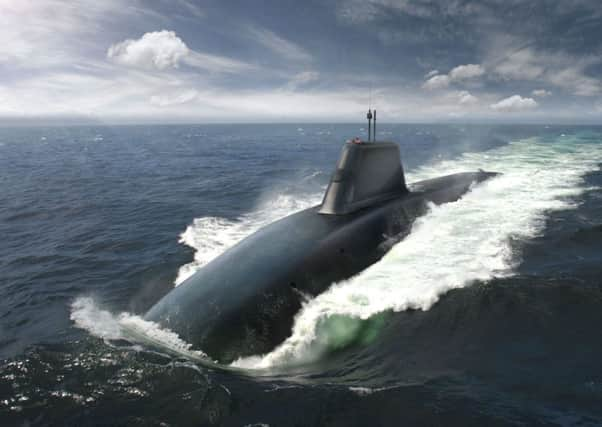John MacDonald: Trident is a risky pawn to use


Last weekend a UK government source declared: “The UK wants to keep Trident nuclear weapons at Faslane, the Scottish Government wants a currency union; we can see the outlines of a deal.”
Cue an array of SNP denials. Ridding Scotland of Trident is, Alex Salmond said, “fundamental to the case for independence”.
Advertisement
Hide AdAdvertisement
Hide AdBut what would the consequences of “making a deal” be for the SNP?
The SNP has worked long and hard to synonymise a vote for independence with a vote for evicting Trident. This narrative has taken root. Scottish CND’s 2012 decision to back the Yes campaign reflects an acceptance that only independence can guarantee a nuclear-weapons-free Scotland. Some polls show nearly 90 per cent of potential Yes voters oppose Trident.
What seems clear is that if Scotland votes for independence, a majority of Yes voters will have voted assuming that their vote was not just for independence but also – as the SNP has repeatedly promised – for evicting Trident. There would be a sizeable public expectation on this issue and – we might surmise – a palpable sense of shocked disappointment if those expectations were not met. SNP credibility would be critically undermined if its Trident negotiations resulted in a permanent home for the UK nuclear force in Scotland.
In approaching negotiations on this issue, the SNP leadership might do well to consider the next Scottish elections, scheduled for May 2016. Having fought so long for independence, it would understandably aspire to being the first elected government of an independent Scotland, with the chance to truly shape the new nation.
Trident negotiations may determine these ambitions. Having won independence for Scotland, a U-turn on its historic Trident eviction demands could well see the SNP facing the Churchillian fate of having won the war only to be voted out of office. This would be an ignominious end to its leadership of an incredible political journey. Given the likely beneficiaries of this would be Labour, a defeat in 2016 would be – from the SNP’s perspective – doubly injurious.
This is not to suggest that the SNP should look solely to its own electoral fortunes if it finds itself leading independence negotiations with London. The outcome of those negotiations would define Scotland’s near-future and a selfless, nation-focused approach would be required in order to secure what is truly best for Scotland.
However, most Scots (including many who will vote No) would agree that evicting Trident is best for Scotland. Given that the SNP has committed itself so volubly to this message and outcome, voters would feel justified in punishing the SNP if – when push came to shove – it agreed to consign Scotland to a nuclear future that most of its citizens do not want.
If Scots do vote Yes, the SNP should throw as much democratic weight as possible behind Trident eviction. A sensible starting point would be to request the formation of an All-Party Delegation on Nuclear Disarmament, tasked with negotiating the smoothest possible transition towards a nuclear-weapons-free Scotland. The other Scottish political parties could hardly be seen to refuse this offer. Uniting the Scottish body politic thus would maximise the strength of Scotland’s hand in Trident negotiations with London.
Advertisement
Hide AdAdvertisement
Hide AdHowever, Scotland would not be unwieldy on the issue of Trident. The White Paper declares (page 247) that Trident removal will be “a priority” but the wording of the commitment to removal by 2020 indicates this deadline is not set in stone. This is a sensible approach, emphasising reasonableness and allaying any concerns in London that Trident relocation might be rushed.
There is much which could be conceded by Scottish negotiators during the post-Yes transition period. Removing Trident should not be one of them, especially not for the ambiguous offer of a “currency deal” many think would happen anyway, and which many others do not want. «
• Dr John MacDonald is director of the Scottish Global Forum www.scottishglobalforum.net